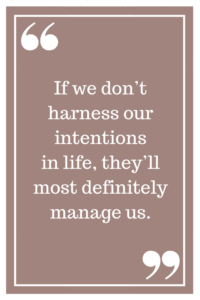How do we live with intention without falling into the cycle of becoming frazzled from being too busy? As a licensed therapist, this is a common question I receive. We know our mental health can and will be impacted by chronically living too full of a life. This is the type of existence when we no longer have margin and activities begin to bleed into one another, with none of them being enjoyable or bearing true fruit. If we don’t harness our intentions in life, they’ll most definitely manage us.
1. Identify Areas of Growth
How do we get clarity about the type of intentional life we want to live? The first step is to write down three-character qualities we want to see in ourselves. These may be some we’ve already cultivated but struggle to maintain, and others will be personal growth goals that have been out of reach until now. Let’s use the following character traits as examples:
- Speaking truth in love
- Living with a positive attitude
- Having grace under pressure
2. Gain New Knowledge
Any life growth must begin with taking the time to educate ourselves. We cannot just set out to make changes and have no idea where we’re headed. Reading books, blogs, watching TED Talks, knowledgeable YouTube vloggers, and other influencers will give us tips and tricks to implement the character growth we want to see in ourselves.
It may take time to find the right advocates and teachers who share knowledge in a way that fits our own personality. Don’t let it discourage you if it takes time to navigate through the many voices out there. Keep it simple and find just a few that address the specific areas of growth you desire in your life. One of the three-character traits listed was speaking truth in love. If that were my actual goal, I’d start by reading everything I could on Dr. Henry Cloud’s website, Boundaries. Dr. Cloud has been a pioneer in the field of communicating with healthy boundaries. Whatever we’ve defined as our goal for intentional living, we can go straight to the source of professional expertise and learn from their years of experience. Intentional living doesn’t include trying to re-invent the wheel on any given topic. If we plan to live with purpose and focus, we must use our time wisely.
3. Find Ways to Try Out Our New Skills
 With the goal of speaking truth in love in mind, my next step would be to seek out specific environments where I can practice feeling comfortable sharing my feelings with others. I’d want to be intentional about seeking healthy people to practice my new skills with and not sabotage myself by selecting individuals who are notorious for their gruff manner or lack of personal insight.
With the goal of speaking truth in love in mind, my next step would be to seek out specific environments where I can practice feeling comfortable sharing my feelings with others. I’d want to be intentional about seeking healthy people to practice my new skills with and not sabotage myself by selecting individuals who are notorious for their gruff manner or lack of personal insight.
As I step out to speak up in love, it’d be helpful to address any inner people pleasing issues that could make me stumble and instead of speaking up, withdraw. On the opposite side of hiding my feelings, living with the intention to speak truth in love could be sidelined if I didn’t learn how to manage frustrations and instead, allowed annoyance to seep into my conversations. That would be counter-productive to my goal of speaking truth in love.
4. Kindly Assess How We Did
Once I was done sharing my thoughts with a trusted person, it’d be important to step back and reflect on the experience. What worked? What didn’t go smoothly? In hindsight, what would I change in the future while trying to speak truth in love? Being able to gently assess ourselves is an important component to personal growth and living with intention.
We’ll derail our plans for intentional living if we’re too critical of our progress. No personal growth ever comes through allowing rigidity to take form. We must embrace grace for ourselves as we progress with mastering new skills. Many people impede their own personal development by allowing a nitpicking attitude to overtake their inner dialogue. People who are harsh with themselves struggle with the ups and downs that come with implementing a life with intention.
5. Try Again
All personal growth takes practice. We must become comfortable with the process or we may decide it’s too much work to live an intentional life and find ourselves backsliding into old habits. Learning to try again is a key component to moving forward with a life of intention. We take what we’ve learned so far and try again. Monitoring the way, we communicate in our inner thoughts helps to keep an eye open for any sabotaging thoughts. In order to try again, we must feel the freedom to grow and change at our own pace.










